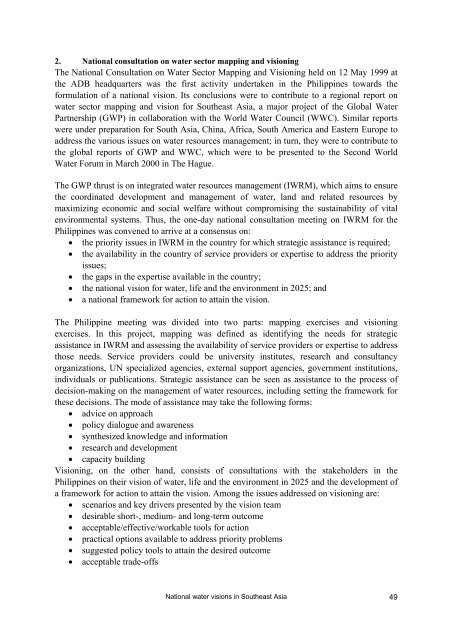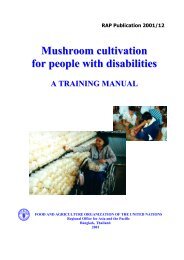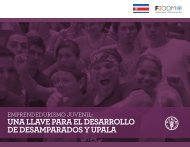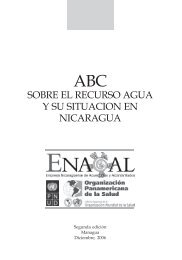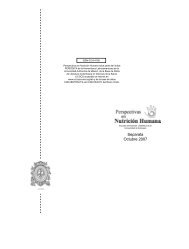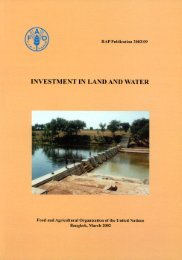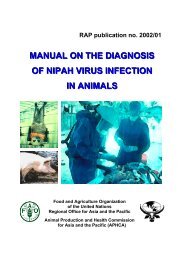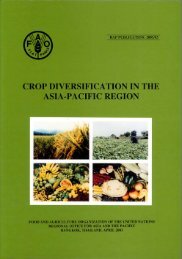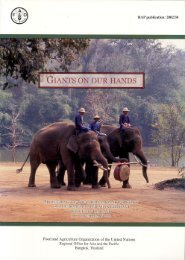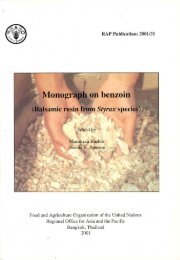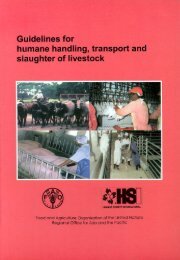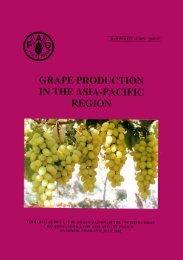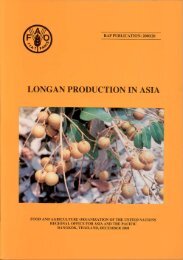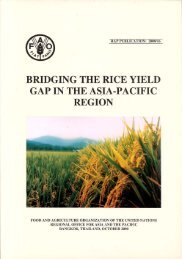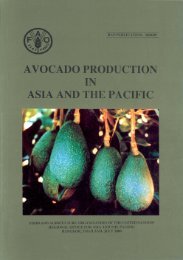The FAO-ESCAP pilot project on national water visions. From vision ...
The FAO-ESCAP pilot project on national water visions. From vision ...
The FAO-ESCAP pilot project on national water visions. From vision ...
Create successful ePaper yourself
Turn your PDF publications into a flip-book with our unique Google optimized e-Paper software.
2. Nati<strong>on</strong>al c<strong>on</strong>sultati<strong>on</strong> <strong>on</strong> <strong>water</strong> sector mapping and visi<strong>on</strong>ing<br />
<str<strong>on</strong>g>The</str<strong>on</strong>g> Nati<strong>on</strong>al C<strong>on</strong>sultati<strong>on</strong> <strong>on</strong> Water Sector Mapping and Visi<strong>on</strong>ing held <strong>on</strong> 12 May 1999 at<br />
the ADB headquarters was the first activity undertaken in the Philippines towards the<br />
formulati<strong>on</strong> of a nati<strong>on</strong>al visi<strong>on</strong>. Its c<strong>on</strong>clusi<strong>on</strong>s were to c<strong>on</strong>tribute to a regi<strong>on</strong>al report <strong>on</strong><br />
<strong>water</strong> sector mapping and visi<strong>on</strong> for Southeast Asia, a major <str<strong>on</strong>g>project</str<strong>on</strong>g> of the Global Water<br />
Partnership (GWP) in collaborati<strong>on</strong> with the World Water Council (WWC). Similar reports<br />
were under preparati<strong>on</strong> for South Asia, China, Africa, South America and Eastern Europe to<br />
address the various issues <strong>on</strong> <strong>water</strong> resources management; in turn, they were to c<strong>on</strong>tribute to<br />
the global reports of GWP and WWC, which were to be presented to the Sec<strong>on</strong>d World<br />
Water Forum in March 2000 in <str<strong>on</strong>g>The</str<strong>on</strong>g> Hague.<br />
<str<strong>on</strong>g>The</str<strong>on</strong>g> GWP thrust is <strong>on</strong> integrated <strong>water</strong> resources management (IWRM), which aims to ensure<br />
the coordinated development and management of <strong>water</strong>, land and related resources by<br />
maximizing ec<strong>on</strong>omic and social welfare without compromising the sustainability of vital<br />
envir<strong>on</strong>mental systems. Thus, the <strong>on</strong>e-day nati<strong>on</strong>al c<strong>on</strong>sultati<strong>on</strong> meeting <strong>on</strong> IWRM for the<br />
Philippines was c<strong>on</strong>vened to arrive at a c<strong>on</strong>sensus <strong>on</strong>:<br />
• the priority issues in IWRM in the country for which strategic assistance is required;<br />
• the availability in the country of service providers or expertise to address the priority<br />
issues;<br />
• the gaps in the expertise available in the country;<br />
• the nati<strong>on</strong>al visi<strong>on</strong> for <strong>water</strong>, life and the envir<strong>on</strong>ment in 2025; and<br />
• a nati<strong>on</strong>al framework for acti<strong>on</strong> to attain the visi<strong>on</strong>.<br />
<str<strong>on</strong>g>The</str<strong>on</strong>g> Philippine meeting was divided into two parts: mapping exercises and visi<strong>on</strong>ing<br />
exercises. In this <str<strong>on</strong>g>project</str<strong>on</strong>g>, mapping was defined as identifying the needs for strategic<br />
assistance in IWRM and assessing the availability of service providers or expertise to address<br />
those needs. Service providers could be university institutes, research and c<strong>on</strong>sultancy<br />
organizati<strong>on</strong>s, UN specialized agencies, external support agencies, government instituti<strong>on</strong>s,<br />
individuals or publicati<strong>on</strong>s. Strategic assistance can be seen as assistance to the process of<br />
decisi<strong>on</strong>-making <strong>on</strong> the management of <strong>water</strong> resources, including setting the framework for<br />
these decisi<strong>on</strong>s. <str<strong>on</strong>g>The</str<strong>on</strong>g> mode of assistance may take the following forms:<br />
• advice <strong>on</strong> approach<br />
• policy dialogue and awareness<br />
• synthesized knowledge and informati<strong>on</strong><br />
• research and development<br />
• capacity building<br />
Visi<strong>on</strong>ing, <strong>on</strong> the other hand, c<strong>on</strong>sists of c<strong>on</strong>sultati<strong>on</strong>s with the stakeholders in the<br />
Philippines <strong>on</strong> their visi<strong>on</strong> of <strong>water</strong>, life and the envir<strong>on</strong>ment in 2025 and the development of<br />
a framework for acti<strong>on</strong> to attain the visi<strong>on</strong>. Am<strong>on</strong>g the issues addressed <strong>on</strong> visi<strong>on</strong>ing are:<br />
• scenarios and key drivers presented by the visi<strong>on</strong> team<br />
• desirable short-, medium- and l<strong>on</strong>g-term outcome<br />
• acceptable/effective/workable tools for acti<strong>on</strong><br />
• practical opti<strong>on</strong>s available to address priority problems<br />
• suggested policy tools to attain the desired outcome<br />
• acceptable trade-offs<br />
Nati<strong>on</strong>al <strong>water</strong> visi<strong>on</strong>s in Southeast Asia 49


